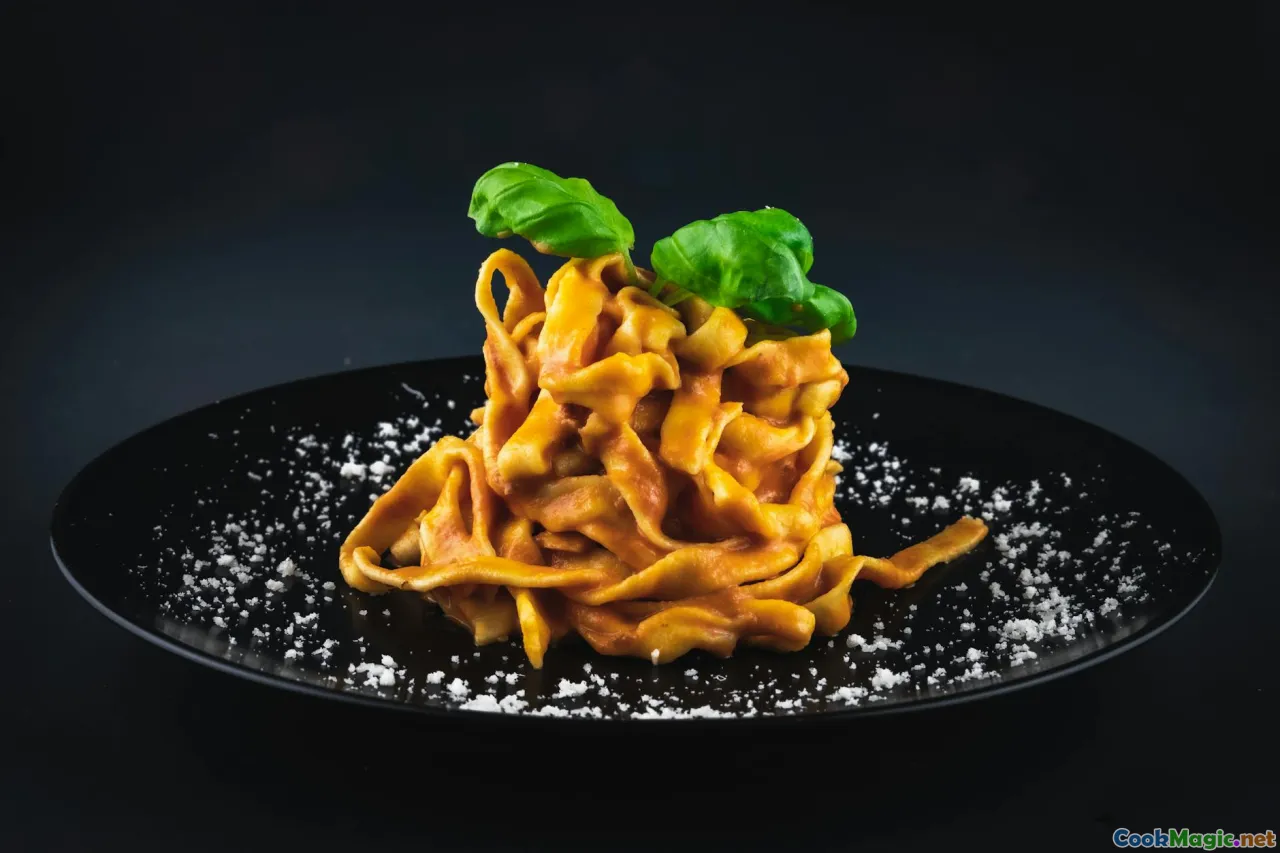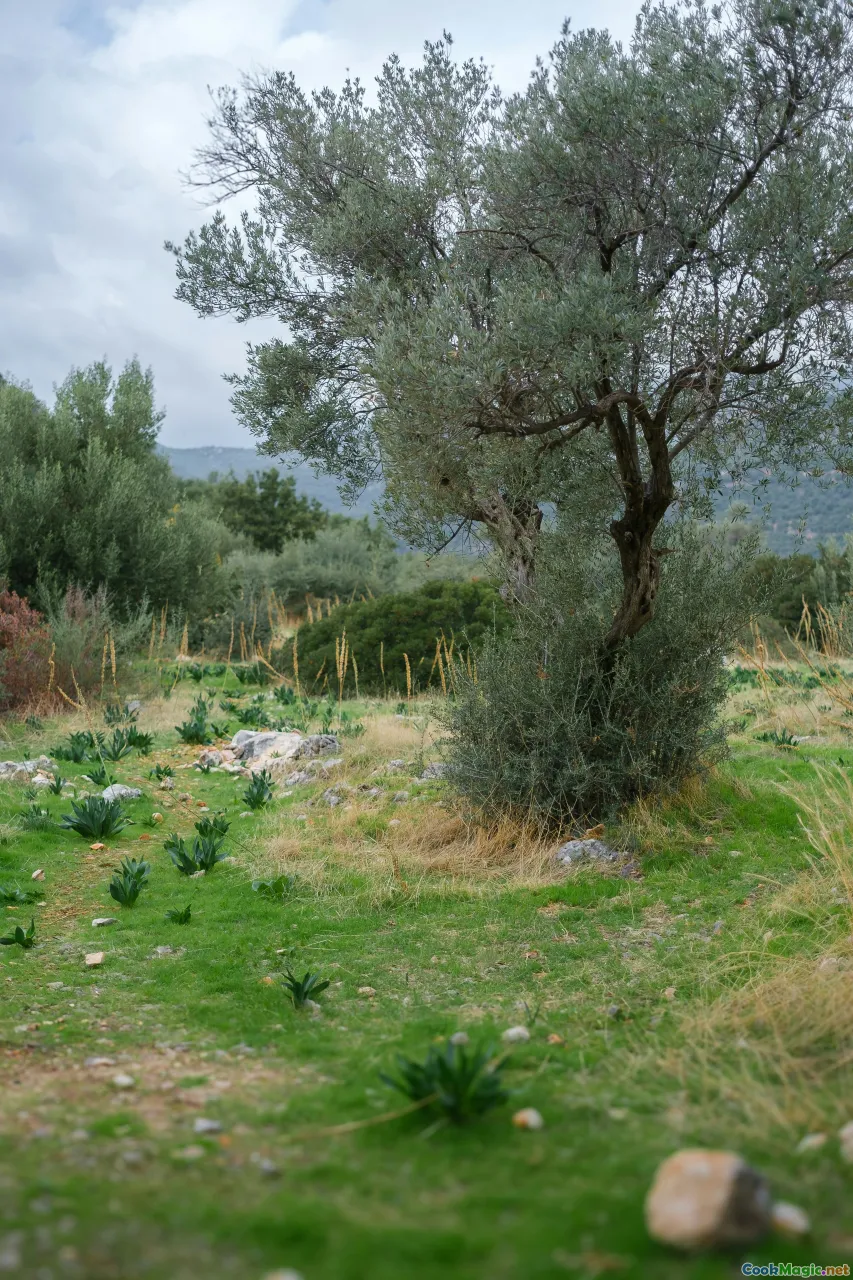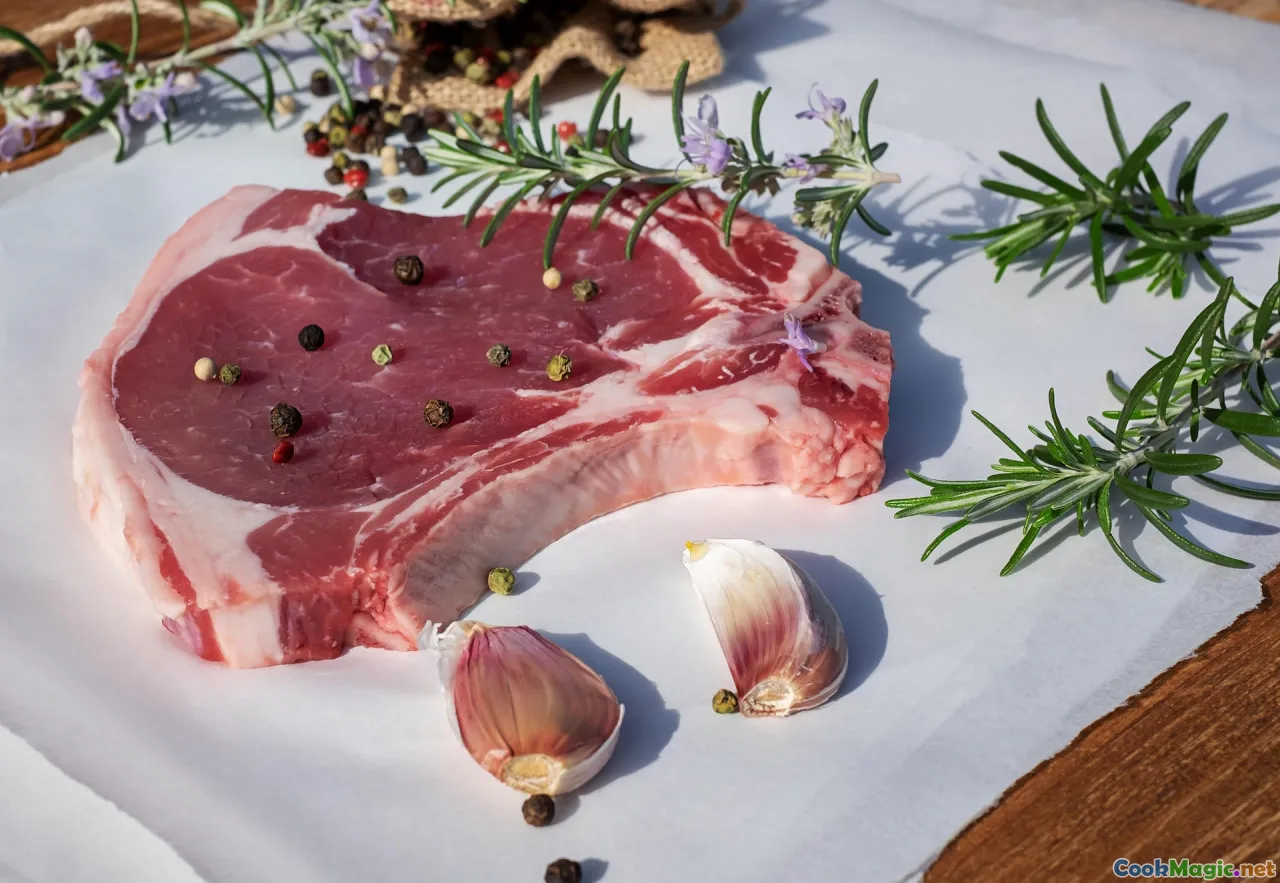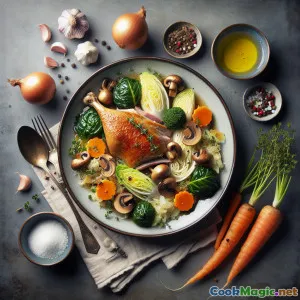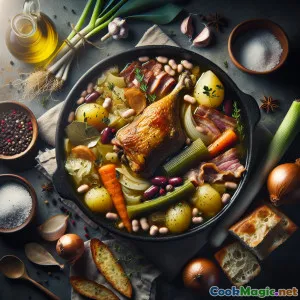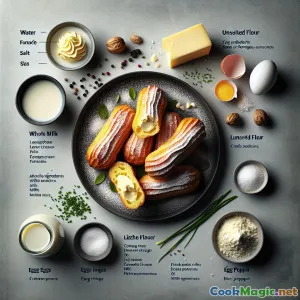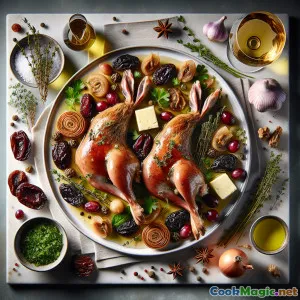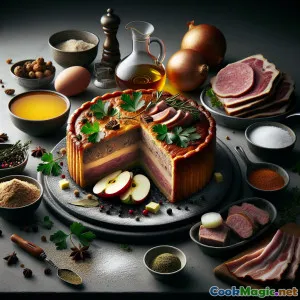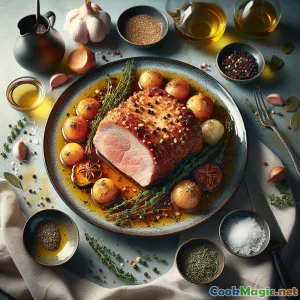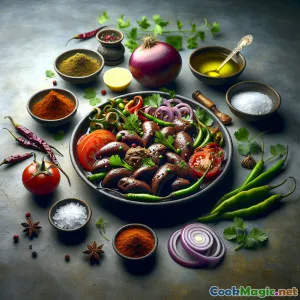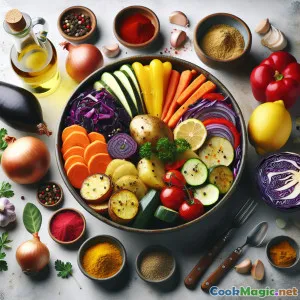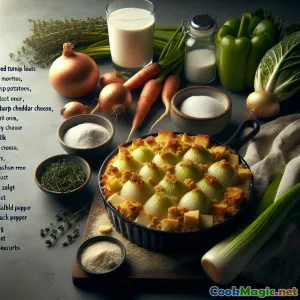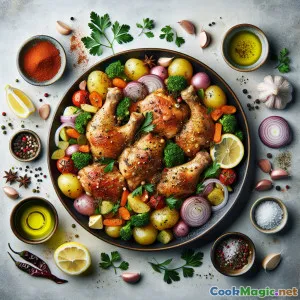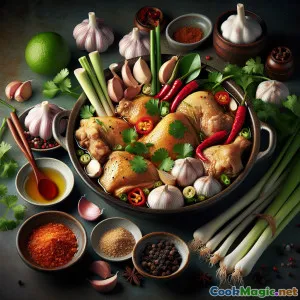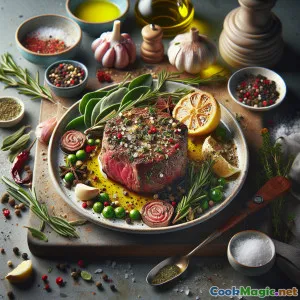
Morbidissimi bocconcini di vitello con erbe del Maquis – Delizia francese
(Tender Veal Bites with Maquis Herbs – French Delight)
(0 Recensioni)0
217
luglio 04, 2025
Segnala un problema
Ingredienti
-
600 grams spalla di vitello
(tagliare a cubetti di dimensioni mordibili)
-
2 tbsp Rosmarino fresco
(Tagliato finemente)
-
1 tbsp Timo Fresco
(Tagliato finemente)
-
1 tbsp salvia fresca
(Tagliato finemente)
-
3 cloves Spicchi d'aglio
(Tritato)
-
3 tbsp Olio extravergine di oliva
(preferibilmente spremuto a freddo)
-
100 ml vino bianco secco
-
1 tsp Scorza di limone
(Grattugiato fresco)
Sale marino, to taste
Pepe nero macinato fresco, to taste
(tagliare a cubetti di dimensioni mordibili)
(Tagliato finemente)
(Tagliato finemente)
(Tagliato finemente)
(Tritato)
(preferibilmente spremuto a freddo)
(Grattugiato fresco)
Nutrizione
- Porzioni: 4
- Dimensione Porzione: 1 piatto (circa 250 g)
- Calories: 420 kcal
- Carbohydrates: 4 g
- Protein: 52 g
- Fat: 22 g
- Fiber: 1 g
- Sugar: 1 g
- Sodium: 350 mg
- Cholesterol: 125 mg
- Calcium: 40 mg
- Iron: 3 mg
Istruzioni
-
1 - Preparare vitello e erbe:
Taglia la spalla di vitello a cubetti di dimensioni bite. Tritare finemente rosmarino, timo, salvia e tritare l’aglio.
-
2 - Marinare il Buff:
Combina il vitello, erbe tritate, aglio, olio d'oliva, sale marino, pepe e scorza di limone in una ciotola. Lascia marinare per almeno 10 minuti.
-
3 - Rosolare Vitello:
Scalda l'olio extravergine d'oliva in una padella grande a fuoco medio-alto. Aggiungi i cubetti di vitello a gruppi per evitare sovraffollamento. Rosola su tutti i lati.
-
4 - Sfumare con il vino:
Aggiungi il vino bianco nella padella e raschia i residui dorati dal fondo. Lascia ridurre leggermente per sviluppare il sapore.
-
5 - Simmer e terminare:
Riduci la fiamma al minimo, copri la padella e lascia cuocere il vitello lentamente fino a renderlo tenero e ben cotto, circa 8-10 minuti. Regola il condimento se necessario.
-
6 - Impiattare e Servire:
Trasferisci i bocconcini di vitello nei piatti da portata. Guarnisci con erbe fresche extra se desideri e servi caldo.
Taglia la spalla di vitello a cubetti di dimensioni bite. Tritare finemente rosmarino, timo, salvia e tritare l’aglio.
Combina il vitello, erbe tritate, aglio, olio d'oliva, sale marino, pepe e scorza di limone in una ciotola. Lascia marinare per almeno 10 minuti.
Scalda l'olio extravergine d'oliva in una padella grande a fuoco medio-alto. Aggiungi i cubetti di vitello a gruppi per evitare sovraffollamento. Rosola su tutti i lati.
Aggiungi il vino bianco nella padella e raschia i residui dorati dal fondo. Lascia ridurre leggermente per sviluppare il sapore.
Riduci la fiamma al minimo, copri la padella e lascia cuocere il vitello lentamente fino a renderlo tenero e ben cotto, circa 8-10 minuti. Regola il condimento se necessario.
Trasferisci i bocconcini di vitello nei piatti da portata. Guarnisci con erbe fresche extra se desideri e servi caldo.
Ulteriori informazioni su: Morbidissimi bocconcini di vitello con erbe del Maquis – Delizia francese
Bocconcini di Vitello alle Erbe del Maquis
Bocconcini di Vitello alle Erbe del Maquis è un piatto raffinato ma rustico proveniente dai sapori del Mediterraneo della Corsica e del Sud della Francia. Il nome significa letteralmente "piccoli bocconi di vitello con erbe del maquis", riferendosi alla fitta macchia mediterranea nativa della Corsica, nota per le sue erbe selvatiche aromatiche come rosmarino, timo e salvia. Queste erbe conferiscono al tenero vitello un aroma unico che evoca i paesaggi selvaggi della regione.
Il piatto celebra la tradizione senza tempo francese di combinare ingredienti semplici e di alta qualità con sapori naturali decisi per valorizzare il delicato gusto della carne. Tipicamente, si utilizza il vitello del cosciotto, offrendo un equilibrio tra tenerezza e sapore intenso. La breve marinatura con queste erbe selvatiche, aglio e olio extravergine di oliva, insieme a un tocco di vino bianco, crea una profondità stratificata ma sottile nei bocconcini finiti.
Cucinare il vitello in piccole porzioni cubiche (bocconcini) assicura una cottura rapida e uniforme, ideale per antipasti da condividere o cene intime. Il piatto è versatile, ottimo da abbinare con polenta cremosa, verdure arrosto o pane rustico fresco.
Dal punto di vista culturale, la ricetta rende omaggio alla tradizione delle isole mediterranee francesi, che traggono ispirazione dalla vegetazione naturale, utilizzando erbe locali in abbinamento a proteine di pregio come il vitello. La semplicità unita alla raffinatezza permette ai cuochi casalinghi di presentare piatti di qualità da ristorante, rispettando le pratiche culinarie tradizionali.
Consigli:
- Usa erbe fresche, tritate con cura per mantenere i loro sapori vivaci.
- Non sovraccaricare la padella durante la rosolatura del vitello per evitare di cuocerlo a vapore.
- Marinare per soli 10-15 minuti — abbastanza per insaporire senza coprire la delicatezza del vitello.
- Regola le erbe a seconda del gusto e della disponibilità per personalizzare.
Questa ricetta offre un modo fantastico per esplorare la cucina mediterranea francese attraverso l’esperienza sensoriale del maquis selvaggio portato nel piatto.

